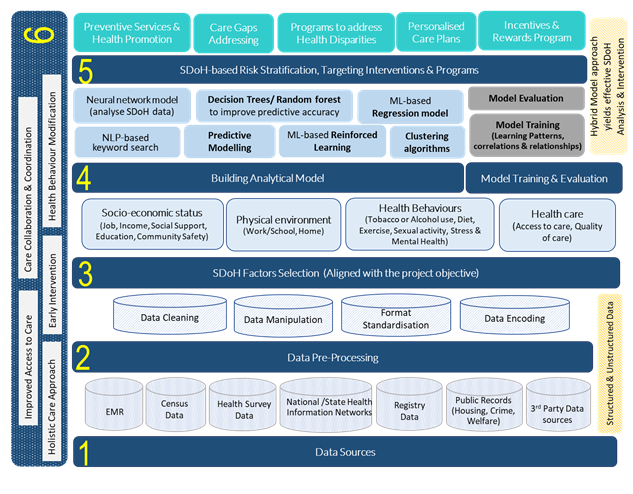
Several non-medical elements contribute towards shaping an individual’s overall health status. These can be economic or social in nature, be it lifestyle choices such as diet or exercise, or the presence of stable employment and income, and are known as the social determinants of health (SDoH). According to the County Health Rankings model, “elements that affect health outcome include social and economic factors (40%), health behaviours (30%), clinical care (20%), and physical environmental factors (10%)”.
Healthcare players and providers have started to acknowledge the importance of including SDoH data as an opportunity to improve patient health outcomes and increase overall savings. This article summarises the approaches of incorporating SDoH data into care decisions and interventions, that could lead to proactive and patient-centric care, thereby yielding greater benefits.
Understanding the power of SDoH
As healthcare shifts toward value-based care, leveraging the power of SDoH data has become more important. Incorporating social factors into care interventions and care programs is crucial because it is directly proportional to better health outcomes, reduced care gaps, and greater overall savings.
Care beyond medical treatment: Beyond medical interventions, social factors such as access to education and care, housing, employment, nutritious food, transportation, social support, alcohol and tobacco use, exercise, and more play a key role in ensuring effective health outcomes.
Addressing health disparities: Health disparities can be handled more effectively by incorporating SDoH data into care decision-making. By implementing targeted interventions to address the needs of vulnerable patients, health equity can be promoted more effectively.
Proactive care and reactive care: By leveraging SDoH data, healthcare systems are shifting from reactive to proactive treatment methods. Addressing social barriers to health for the increasingly at-risk population or people with comorbidities can reduce the progression of risk, thus lowering the need for costly treatments.
Data analytics and predictive modelling for triggering SDoH-based interventions
Data analytics and predictive modelling play a critical role in determining SDoH barriers and related interventions. Using such models, SDoH data from multiple sources can be analysed to identify patterns, trends, and relationships that indicate how social factors become social barriers affecting patient health.
Approach to building a Predictive AI/ML model:
- Architecting a model specifically to meet the program objective, for example, addressing mental behavioural issues, addressing medication non-adherence, access to care issues, etc.
- Adapting a hybrid model approach will yield more effective SDoH analysis and interventions. For instance, combination of clustering algorithm and decision tree classifier can be used to more accurately predict SDOH based risk at population level.
- Combining data sets from multiple sources may be challenging, but the result can be highly beneficial to address SDoH.
- The analysed data is used to generate patient risk-based stratification. Tailored care interventions are then created to target the areas that will have the greatest impact. Targeted interventions will help improve health outcomes and mitigate health disparities associated with social determinants of health.
- Providing insights to personalised care management by leveraging historical data.
- Refining the care intervention continuously will yield better outcomes.

SDoH-based risk stratification: AI/ML models can stratify individuals based on their social determinants, assigning a risk score to each individual which indicates the likelihood of experiencing adverse health outcomes. These scores help identify individuals who are at rising or high risk and may require targeted interventions or additional care.
Personalised care management: SDoH-based risk stratification can be utilised to develop personalised care management programs to recommend suitable care interventions. For example, individuals at higher risk due to tobacco use may receive targeted behavioural health support or referrals to community resources addressing behavioural factors.
Outcome analysis
The impact of the SDoH-based care interventions on health outcomes and care costs can be measured using outcome analysis reports, which can be a part of the model evaluation process. These reports will enable health systems to make data-driven decisions and continuously improve their approach to effectively address SDoH barriers.
Achievable benefits powered by SDoH
| Improved health outcomes | SDoH-driven interventions will witness significant improvements in patient health outcomes, especially in Medicaid programs. |
| Enhanced care coordination | The SDoH-driven initiatives will improve continuity of care services by addressing social factors that affect care coordination, such as transportation barriers, patient education, access to technology, a lack of social support, etc. |
| Decrease in hospital readmission rate | Hospital readmissions will decline among patients who have access to targeted social interventions, which will save care costs and also boost plan ratings. |
| Improved chronic disease management | Addressing socioeconomic factors like food insecurity and medication accessibility will improve chronic disease management, which will enhance patient quality of life and minimise the need for medical services. |
| Increased patient engagement | Utilising SDoH interventions to overcome preventive care barriers will result in increased patient engagement, early disease detection, and a decline in disease progression. |
| Decrease in emergency room utilisation rate | Targeted care interventions based on SDoH data will result in reduced Emergency Room (ER) visits, implying improved care management and cost savings. |
| Promote holistic wellness | Providing incentives to members who take part in programs designed to meet their SDoH needs not only motivates them but also helps them get over care barriers and take control of their health journey. |
To conclude, healthcare can be revolutionised by proactively leveraging SDoH data and incorporating SDoH-driven care interventions. This strategy will not only enhance patient health outcomes and member satisfaction but also result in substantial cost savings. Health systems must redefine themselves to embrace the power of SDoH-driven interventions to build healthier, and more resilient communities.






